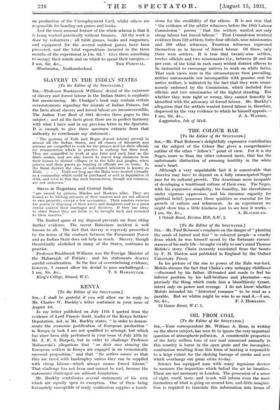SLAVERY IN THE INDIAN STATES
[To the Editor of the SPECTATOR.] Sta,—Professor Rushbrook Williams' denial of the existence of slavery and forced labour in the Indian States is emphatic but unconvincing. Mr. Chudgar's book may contain certain overstatements regarding the misrule of Indian Princes, but the facts about slavery and forced labour are incontrovertible. The Indian Year Book of 1931 devotes three pages to this subject ; and all the facts given there are in perfect harmony with what I have said in my previous letter to the Spectator. It is enough to give three specimen extracts from that authority to corroborate my statement : "The systems of Veth and Begar (forced labour) prevail in almost all the Indian States, and all classes of labourers and artisans are compelled to work for the princes and for their officials for remuneration which in practice is nothing but their food. They are compelled to work at any time and such time as the State wishes, and are also forced to travel long distances from their homes to distant villages or to the hills and jungles, when princes and their guests go hunting or officials are on tours. In the Surat district the class of indentured labourers is known as Halis. . . . Until not long ago the Halis were treated virtually as a commodity which could be purchased or sold in liquidation of debt, and even to this day such transactions, though not common, are not unknown."
Slaves in Rajputana and Central India
"are owned by princes, Hindus and Moslems alike. They are bound to be lifelong servants of their masters and are not allowed to own property, except a few necessaries. Their masters exercise the power of disposing of their wives and daughters and to a great extent control their marriages and divorces. If they ran away to other States they are liable to be brought back and returned to their masters."
The limited space at my disposal prevents me from citing further evidence. The recent Balasinore incident is well known to all. The fact that slavery is expressly proscribed by the terms of the contract between the Paramount Power and an Indian State does not help us much. Slavery, though theoretically abolished in many of the States, continues in practice.
Professor Rushbrook Williams was the Foreign Minister of the Maharajah of Patiala ; and his statements deserve careful consideration. In the face of overwhelming evidence, however, I cannot allow his denial to pass unchallenged.—






























 Previous page
Previous page